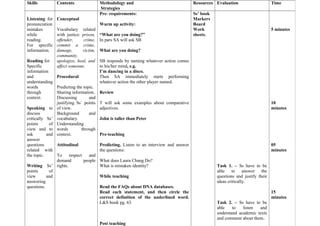DAILY LESSON PLAN; SAMPLE
•Transferir como DOC, PDF•
2 gostaram•2,205 visualizações
This document contains a lesson plan for a language skills class with the following key details: The lesson plan is for a 4th semester class at the Universidad Nacional de Chimborazo on May 27, 2013. The topic is "A Different Path to Justice" and the objective is for students to express their own points of view in writing and orally and justify them critically. The lesson involves reviewing simple past tense and short/full answers, predicting topics of an interview, reading about DNA databases, and two tasks for students to answer questions and comment on academic texts. The lesson will use various materials and last a total of 50 minutes divided between several activities.
Denunciar
Compartilhar
Denunciar
Compartilhar

Recomendados
Mais conteúdo relacionado
Mais procurados
Mais procurados (8)
Ig 2 and as revisiosn modes of-third-person-narration-lesson

Ig 2 and as revisiosn modes of-third-person-narration-lesson
Bmc english language_composition(situational writing)_recounts

Bmc english language_composition(situational writing)_recounts
Destaque
Destaque (20)
Final sma lesson plan speaking and appendices[1] 1![Final sma lesson plan speaking and appendices[1] 1](data:image/gif;base64,R0lGODlhAQABAIAAAAAAAP///yH5BAEAAAAALAAAAAABAAEAAAIBRAA7)
![Final sma lesson plan speaking and appendices[1] 1](data:image/gif;base64,R0lGODlhAQABAIAAAAAAAP///yH5BAEAAAAALAAAAAABAAEAAAIBRAA7)
Final sma lesson plan speaking and appendices[1] 1
Teacher Training: Lesson Planning Presentation Jan09

Teacher Training: Lesson Planning Presentation Jan09
Semelhante a DAILY LESSON PLAN; SAMPLE
Semelhante a DAILY LESSON PLAN; SAMPLE (20)
· Promotions· Flyers· Email· Social Media· Advertising· .docx

· Promotions· Flyers· Email· Social Media· Advertising· .docx
Social science. Conflict and conciliation - changing chairs

Social science. Conflict and conciliation - changing chairs
Mais de César Narváez Vilema
Mais de César Narváez Vilema (20)
DAILY LESSON PLAN; SAMPLE
- 1. Skills Contents Methodology and Strategies Resources Evaluation Time Listening for pronunciation mistakes while reading. For specific information. Reading for Specific information and understanding words through context. Speaking to discuss critically Ss’ points of view and to ask and answer questions related with the topic. Writing Ss’ points of view and answering questions. Conceptual Vocabulary related with justice: prison, offender, crime, commit a crime, damage, victim, community, apologize, heal, and affect someone. Procedural Predicting the topic. Sharing information. Discussing and justifying Ss` points of view. Background and vocabulary. Understanding words through context. Attitudinal To respect and demand people rights. Pre- requirements: Warm up activity: “What are you doing?” In pars SA will ask SB What are you doing? SB responds by naming whatever action comes to his/her mind, e.g. I’m dancing in a disco. Then SA immediately starts performing whatever action the other player named. Review T will ask some examples about comparative adjectives. John is taller than Peter Pre-teaching Predicting. Listen to an interview and answer the questions: What does Laura Chang Do? What is mistaken identity? While teaching Read the FAQs about DNA databases. Read each statement, and then circle the correct definition of the underlined word. L&S book pg. 63 Post teaching Ss’ book Markers Board Work sheets. Task 1. – Ss have to be able to answer the questions and justify their ideas critically. Task 2. – Ss have to be able to listen and understand academic texts and comment about them.. 5 minutes 10 minutes 05 minutes 15 minutes
- 2. LESSON PLAN 1.- INFORMATION DATA: Institution: Universidad Nacional de Chimborazo Teacher: Mgs. César Narváez Year: 4th semester “A and B” School year: 04- 2013 a 07-2013. Date: May, 27th 2013. Subject: Language Skills III 2. – CLASS ORGANIZATION. Area: Language Skills Unit: Two Topic: A different path to Justice Unit objective: To express Ss’ own points of view in written and orally, and to justify them in a critical way. Class objective: To be able to listen and understand academic listening exercises. 3. - DIDACTICS PROCESS Scientific knowledge.- Simple Past Tense.- Use the Simple Past to express the idea that an action started and finished at a specific time in the past. Sometimes, the speaker may not actually mention the specific time, but they do have one specific time in mind.
- 3. Short and full answers.- Question Affirmative Negative Do we know him? Yes, we do. No, we don’t. Can she see me? Yes, she can. No, she can’t. Have they read the book? Yes, they have. No, they haven’t. Is he hungry? Yes, he is. No, he isn’t. Biography: North Star 2. Third Edition. Reading and Writing.
